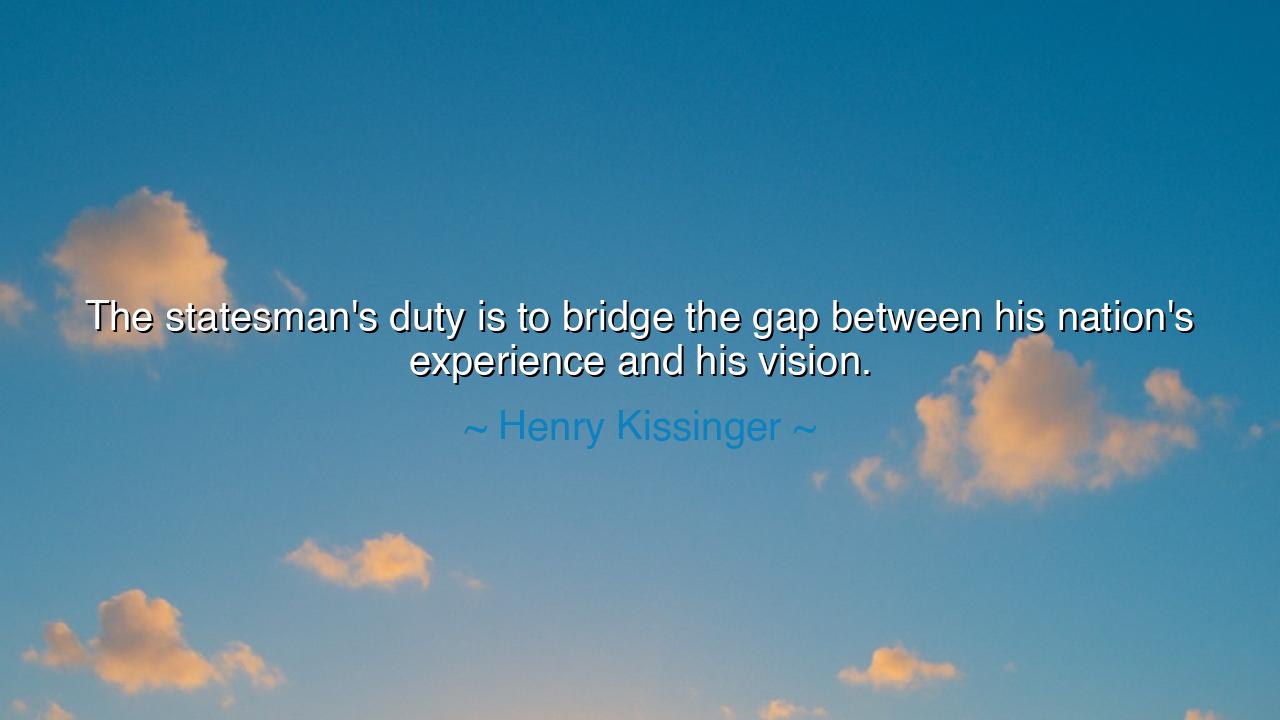
The statesman's duty is to bridge the gap between his nation's
The statesman's duty is to bridge the gap between his nation's experience and his vision.






Host: The room feels quiet, the soft glow of the lamp casting a gentle light across the space. Outside, the world is still, and the peaceful atmosphere invites deeper conversation. Jeeny sits on the couch, her legs tucked beneath her, her fingers lightly tapping on the armrest, deep in thought. Jack, standing near the window, looks out at the darkening world, clearly reflecting on something. The calm of the evening creates the perfect atmosphere for a discussion about leadership, vision, and the responsibilities of those who govern.
Jeeny: “Jack, I came across a quote from Henry Kissinger today that made me reflect on leadership,” she says softly. “He said, ‘The statesman’s duty is to bridge the gap between his nation’s experience and his vision.’ What do you think about that?”
Jack: He turns slowly, his expression thoughtful. “That’s a profound statement. It seems like Kissinger is talking about the balance a leader must strike — between the reality of what’s happening now and the ideal future they hope to create. A statesman, in this sense, isn’t just someone who makes decisions based on the present, but someone who has a vision of what could be and uses that vision to guide the country forward. But to do that effectively, they need to understand the nation’s experience, the challenges, history, and needs of the people.”
Jeeny: “Exactly. The statesman’s role isn’t just about making decisions in the moment, but about connecting that vision to what people have lived through, what they know, and what they’ve experienced. A leader has to acknowledge where the nation is right now, both the strengths and weaknesses, and then use that understanding to lead toward something better. It’s a process of translation — translating experience into a shared vision for the future.”
Host: The light in the room feels warmer now, as if the conversation is touching on something essential about leadership. Jeeny speaks with an understanding that leadership requires not just an idealistic vision, but a grounded awareness of the people being led, the challenges they face, and the history they’ve lived through. Jack stands still for a moment, reflecting on how leadership often requires walking a fine line between aspiration and reality.
Jack: “It’s interesting because a lot of times, we think of leadership as just having a vision — something bold and forward-thinking. But what Kissinger is saying is that the best leaders are those who understand their nation’s current state, their history, and the realities of their people’s experiences. It’s about creating a vision that is rooted in those realities, not something disconnected or out of touch with what the people actually need or want.”
Jeeny: “Exactly. If the leader is too focused on the vision without understanding the experience of the people, the gap becomes too wide. That’s when you get disconnection, frustration, and even failure. But when a leader bridges that gap, they’re able to inspire and guide people toward change in a way that feels achievable and relevant. The people can see themselves in that vision.”
Host: The conversation seems to deepen as they reflect on the role of the statesman as someone who not only leads with vision but also bridges the gap between idealism and realism. Jeeny and Jack both agree that the best leaders are those who are deeply connected to the experiences of their people, who understand their struggles and dreams, and who use that understanding to craft a vision for the future that is both inspiring and realistic.
Jack: “I think that’s what makes leadership truly powerful — the ability to connect vision with reality. It’s about understanding where people are, where they’ve been, and where they want to go, and then making that journey feel possible. A good leader is someone who can see the path forward and show the people how they can get there, even if the road is difficult.”
Jeeny: “Exactly. And Kissinger’s idea reminds us that leadership isn’t just about ideals or abstract goals. It’s about people. It’s about building trust, finding common ground, and leading with both clarity and compassion for where the people are. A great statesman doesn’t just have a vision; they know how to bring people along on that journey.”
Host: The room feels quieter now, the weight of their conversation settling in. Jeeny and Jack sit together, reflecting on how the best leadership is rooted in both vision and experience. Henry Kissinger’s words remind us that great leaders are those who bridge the gap between where we are and where we aspire to be — by deeply understanding the realities of their people and guiding them toward a better future. True leadership is about connection, understanding, and inspiring others to reach for a shared vision, grounded in the experience of the present.






AAdministratorAdministrator
Welcome, honored guests. Please leave a comment, we will respond soon